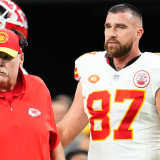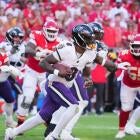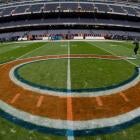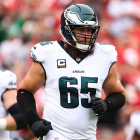
Super Bowl 2023: Eagles addressing defensive backfield among under-the-radar moves that powered team's success
Also, the in-season signings of Ndamukong Suh and Linval Joseph helped fill a major void for the Eagles

The Philadelphia Eagles forged an easy path to Super Bowl LVII, based on the dominance of the team throughout the regular and postseason, sparked by the MVP-caliber play of Jalen Hurts and a historic pass rush that has the third-most sacks in a season in NFL history (including postseason).
Philadelphia was the last unbeaten team this season, showcasing its dominance all year as the Eagles sprinted to a 13-1 start and locked up the No. 1 seed in the season's final week. The Eagles cruised through the playoffs, becoming the first team in NFL history to win consecutive playoff games by scoring 30-plus points and allowing fewer than 10.
The Eagles have been dominant all year, having stars across the board on offense and defense. Players like Hurts, A.J. Brown, Jason Kelce, Miles Sanders, DeVonta Smith, Lane Johnson, Haason Reddick, Javon Hargrave, and Darius Slay have set the foundation for a Super Bowl contender.
The Eagles did make some signings before the season and in-season that helped pave the way to reach Super Bowl LVII -- and potentially hoist the Vince Lombardi Trophy. These are the moves that weren't talked about enough to help get the Eagles to Super Bowl LVII.
Nov. 17: Signed Ndamukong Suh to one-year deal
The Eagles had trouble stopping the run in the two games rookie Jordan Davis was out (foot), allowing 160 rushing yards a game. Needing reinforcements on the defensive line, the Eagles were able to lure Suh to Philadelphia on a one-year deal after their first loss of the season in Week 10.
The individual stats don't describe Suh's impact on the defense, as Philadelphia has allowed just 114.4 rushing yards per game in the 10 games Suh has been on the roster (including postseason). The pass rush went on an absurd tear, having 49 sacks in the 10 games since acquiring Suh. The defense has allowed just 19.1 points per game.
Prior to Suh's arrival, the Eagles allowed 124.8 rush yards per game and had just 29 sacks. The defense significantly improved since Suh's arrival, as evidenced by the 7.0 points per game and eight sacks this postseason.
Nov. 16: Signed Linval Joseph to one-year deal
One day before the Eagles signed Suh, they managed to sign Joseph on a one-year deal to help out the run defense. Joseph made an immediate impact on a defensive tackle position that already consisted of Fletcher Cox and Hargrave. Suh and Joseph rotated on the early downs, giving Cox and Hargrave much-needed rest with Davis out.
Joseph's impact was similar to Suh's -- just look at Haason Reddick's numbers since both arrived. Reddick has 13 sacks in the 10 games since both veterans joined the team.
Aug. 30: Acquired Chauncey Gardner-Johnson from the Saints
The Eagles went through training camp with uncertainty at the safety position, as Marcus Epps, Jaquiski Tartt, and Anthony Harris were competing for the two safety spots. Safety was a position of concern and need, even as Epps showed during camp he deserved one of the two starting spots after being the No. 3 safety the previous two seasons.
With Slay and James Bradberry at cornerback, Eagles general manager Howie Roseman found some insurance in Gardner-Johnson days before the 53-man roster cutdown. Philadelphia acquired Gardner-Johnson (and a 2025 seventh-round pick) from the New Orleans Saints for a 2023 fifth-round pick and a 2024 sixth-round pick.
Gardner-Johnson moved to the other safety position opposite Epps as the Eagles cut Tartt and Harris. Moving from cornerback to safety didn't affect Gardner-Johnson as he finished tied for the league lead with six interceptions despite missing five games with a lacerated kidney.
Opposing quarterbacks had a 58.3 passer rating targeting Gardner-Johnson on the season, as he allowed just 39 passing yards in the playoffs. Those questions at safety were answered real fast.
May 18: Signed James Bradberry to one-year deal
The Eagles had Slay on the roster for two seasons, but never had a good No. 2 cornerback to pair with him. Steven Nelson was solid, yet not good enough to help the Eagles defense become elite. When the New York Giants released Bradberry as a salary cap casualty, Slay convinced the Eagles to pounce.
Why did the Eagles finish with the No. 1 pass defense in the NFL? Look no further than the impact Bradberry had. Bradberry allowed opposing quarterbacks to complete just 44.4% of their passes with a 41.5 passer rating -- the lowest of all qualified defensive players.
Slay and Bradberry formed the best cornerback duo in the NFL, and the All-Pro is set to cash in this offseason. Bradberry only cost $7.25 million for that level of production.
May 6: Signed Reed Blankenship as UDFA
The Eagles signed 12 undrafted free agents after the NFL Draft, but none of them made the impact Blankenship did at a safety position that needed depth. Blankenship won't wow anyone with his box score, but he filled in admirably when Gardner-Johnson was out with a lacerated kidney.
Blankenship, who surprisingly earned his spot on the roster over Harris and Tartt, wasn't on the active roster for the majority of the early part of the season. He only played three defensive snaps on the year before filling in for Gardner-Johnson, allowing just one passing touchdown in the five games he's started. Blankenship has also been a valuable special teamer and may be a starter down the road for Philadelphia.
The Eagles don't get the No. 1 seed without Blankenship at safety -- a huge aspect why Philadelphia had the No. 1 pass defense.


















